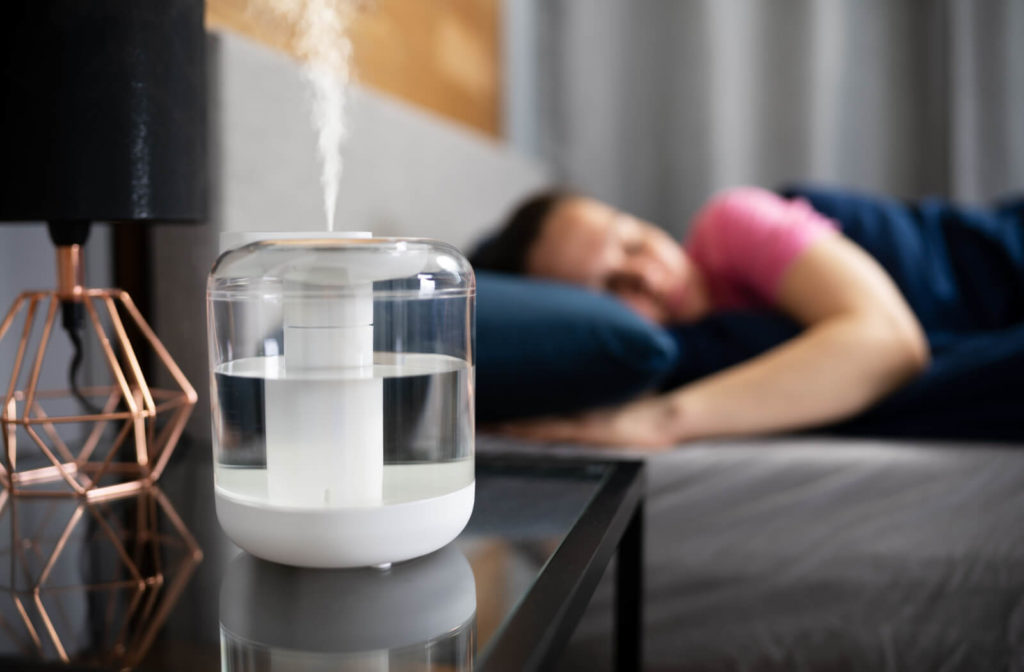Waking up with dry, irritated eyes can be frustrating—not to mention it’s not a great way to start your day.
Waking up with dry eyes in the morning may indicate that you are experiencing the symptoms of dry eye disease: an often chronic condition caused by too much tear evaporation or not enough tear production. Your optometrist can assess the health of your eyes at a comprehensive eye exam to help determine if you have dry eye disease.
What Causes Dry Eyes in the Morning?
Though it might seem like a minor inconvenience, dry eye can lead to more severe complications if left untreated. So, what causes dry eyes in the morning?
Many factors can contribute to uncomfortable dry eye symptoms, such as:
- Sleeping with your eyes partially open
- Exposure to dry air
- Some medications
- Autoimmune disorders
- Age-related changes
Finding the underlying cause of your dry eyes helps to treat and prevent the symptoms. Taking steps to improve your eye hygiene, using lubricating eye drops, and staying hydrated are some measures you can take to alleviate the discomfort.
Symptoms of Dry Eye Syndrome
You might be experiencing symptoms of dry eye syndrome if you’ve ever felt like your eyes were scratchy or uncomfortable. This condition occurs when your eyes don’t produce enough tears, or your tears evaporate too quickly.
Symptoms can include:
- Burning
- Irritated, scratchy eyes
- Aching near your eyes
- Heavy eyes
- Fatigued eyes
- Sore eyes
- Dryness sensation
- Red eyes
- Photophobia
- Blurred vision
It’s important to talk to your eye doctor if you experience any of these symptoms to determine the best course of treatment. Don’t suffer in silence. Relief from dry eye is possible with proper management and care.
How to Treat & Prevent Dry Eyes
The good news is that there are steps you can take to prevent and treat dry eye. You can help avoid dry eyes by practicing good eye hygiene, like washing your hands before touching your eyes and avoiding rubbing them.
Warm Compress for Dry Eye
Warm compresses can help. Make sure your compress is warm, not hot, and leave it on for 10–20 minutes per eye.
Artificial Tears
You can also use artificial tears or eye drops to moisten your eyes. There are several over-the-counter remedies and many by prescription drops, too. Be sure to speak with your optometrist to find out what type is best for you.
Take Screen Breaks
If you spend a lot of time staring at screens, take breaks every 20 minutes or so to rest your eyes. You can practice the 20-20-20 rule at home or at the office: every 20 minutes, take a 20-second break to look at something 20 feet away. This gives your eyes a chance to rest and readjust to a new distance.
Stay Hydrates
Finally, make sure you’re staying well-hydrated and eating a healthy diet rich in omega-3 fatty acids, as these can promote healthy tear production. With these strategies, you may be able to say goodbye to dry, irritated eyes and say hello to clear, comfortable vision.

Taking Care of Dry Eyes in the Morning, Day, & Night
Waking up with dry eyes in the morning is very common for those who experience dry eye syndrome. It is essential to recognize the signs and symptoms that come with this medical condition and the common risk factors that can contribute to it.
When seeking treatment for dry eyes, your doctor may recommend a combination of medications and lifestyle changes. For additional help, there are many home remedies your optometrist can recommend to help.
Additionally, it is important to remember to keep your eyes healthy by using preventative measures such as wearing sunglasses in sunlight and taking breaks from screens if you use them frequently.
If you experience dry eyes or frequent symptoms related to it, you can speak with Pinnacle Eye Care today. We can help determine reliable and effective treatments for your long-term health and well-being.






